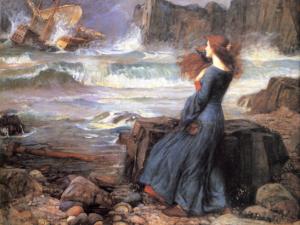Nobody was ever damned simply by hearing an idea. This kind of magical thinking is forbidden to Christians or we would have to rip parts of the Bible out (Judges) that describe ideas that caused wicked actions.
 Being wrong and acting on it matters. . . being wrong? That can be jolly if one uses care and uses the wrong idea combined with the dialectic, and divine Revelation to become right. We are too hasty to think that we must act when we hear an idea.
Being wrong and acting on it matters. . . being wrong? That can be jolly if one uses care and uses the wrong idea combined with the dialectic, and divine Revelation to become right. We are too hasty to think that we must act when we hear an idea.
We can hear an idea and say: “Hmm.” This “hmm” can lead to our deciding that the idea is false, that the idea is harmful in all places at all times, or the idea is harmful now. You can even be wrong and not act on the wrong idea.
If I think that the Earth is flat, then I am very wrong. If I never act on this belief, then it is not so harmful to me! I do not want false beliefs, but I do not need to fear them as if one bad idea will send me straight to a hot place where bad ideas are half-baked.
Ideas cannot be saved or be damned. Ideas can be false . . . ideas can be true. . . ideas can be bad if we act on them . . . or good. . . but ideas? They do not act without people. Take this idea: “God exists.” This is an idea Christians believe, but it is not a Christian idea. The idea itself is not Christian. In fact, this proposition is affirmed by many, many people who think Christianity is false.
This is why we can read even ideas that are false without fear. The Bible can quote the fool without being foolish. We can study and learn even false ideas (as false ideas) without harm!
In our daily speech we all talk about “Christian ideas” or “atheist ideas” or “Islamic ideas” and that is acceptable unless it leads to confusion We must be careful to remember that what we mean when we talk that way is that a Christian, atheist, or Muslim has adopted an idea.
We must never assume we own an idea in the practical or political world until we have put our flesh on the idea by acting on it. We can take some credit for an idea and its consequences when we have the courage to incarnate it. Even then, the idea does not belong to us.
The worst offenders in this area are those who think that the good ideas about government in the West of the world are “secular.” In one sense of the word “secular,” this is obviously true. “Secular” can mean “not about church things” (loose definition) and in this sense discussions about government were about the “secular.” If every single person in America were a traditional Christian, we would assert that politics is “secular.” In fact, in the Middle Ages there were “secular clergy” who lived outside of religious orders!
There is a weird notion that we can celebrate the goodness in Western Europe and North America without any reference to the overwhelming Christian heritage of those places. People believe that certain ideas (democracy, free speech, the American Constitution) are “secular” and saved Europe or North America from the horrors of their religious past.
But no idea ever implemented itself!
Ideas are nobody’s property. They can be used by anyone: often for good or bad. In forming the “awesome thinker list” there is use in knowing who said a thing first, but we should be as interested in who implemented it first and best. Imagine Bob the Pagan who says: “Wow! Earth is sphere-like!” This is a great moment in the history of ideas. However, if Susan the Christian is the one who combines her religious beliefs with Bob’s idea and sails around the world, then Susan the Christian will get a great deal of credit for making the idea work.
To the man who knows the earth is spherical and never does anything with that, the world might as well be flat.
Democracy has many parents. The Greeks contributed the word and an early imperfect form of practicing democracy. The pagan Romans pushed the idea and decided (following thinkers like Plato) that pure democracy would not work as well as a republic. Christian philosopher John Locke defended that idea based on Christian revelation combined with reason (First and Second Treatise). The American founding was led by Christians and deists made it work.
They produced a Constitution that was “secular” in the sense that it did not deal with church stuff, but they lived in such a pervasively Christian culture that they artlessly signed it “in the year of our Lord.” The vast Christian majority of the United States decided the Constitution was a good idea and voted to accept it. In short, the ideas came from a variety of “parents” (including the Iroquois!), but it was implemented and maintained in an overwhelmingly Christian state.
If you love your rights, thank a Christian. If we had not decided that God wanted us to give them to you, then you would not have them. When some Christians wanted to add “Jesus” to the Constitution at a time when the Republic was very, very Christian, most Christians thought this unnecessary and insulting to minority groups in the nation. Our “first freedom” of religion came from Christians who rapidly extended it to non-Christians (imperfectly) because they thought they should.
Coming out of World War II, the Christian majority in Europe realized that they needed to stop blowing it. They united around the ideals of social democracy. Some of the states retained state churches (Britain to this day). Some kept church taxes from the state (Germany). All of Western Europe looked at the ideas of history, from any source, their Christian faith and created the social order in which Europeans live today.

European Christianity (unlike American Christianity) began to fade after the early 1960’s, but we still live in the world created after World War II. The majority of Europe is now spiritual, not Christian. It includes large atheist minorities (large by historic standards). The question is whether a religious Europe that is not mostly Christian can propagate, defend, and extend what they inherited.
Churlish chronological snobs shout: “What about the Dark Ages!” They suggest that when Christianity was most powerful Europe was much less desirable than it is today. There are many problems with this view, but two are sufficient to show the vacuity. First, it is ungrateful. Imagine mocking early computers and computer makers because of how “stupid” and hard their computers were to use. Such a critic forgets that the early computers made our machines possible today just as our machines made those coming possible.

Christians of the Middle Ages were learning the hard lessons and inventing the systems that enable us to live as we do today. The Catholic Church began to lay down the idea of international law. Thinkers like Aquinas wrestled with revelation, Greek thought, and Islamic thought to produce new concepts. Practical Christians were finding ways to ban slavery and implement the ideas of love found in the Gospel. They often did this very badly, but the Christian philosophers and men of affairs in that period created the vocabulary and the environment for later progress.
Second, assume that all the ideas came from atheists. Atheists are and always have been a tiny minority. To implement these ideas, the atheist would require the assent of the Christian governed. We were not fooled: we voted for liberation because we found it compatible with our Faith. Whatever Lincoln’s own religion was (for example), there is no dispute that he ran for political office making Evangelical Christian arguments and appealing to Evangelical voters using those “Sunday School” tactics. Men like William Jennings Bryan laid the Biblical case for the social reforms of later governments.
I think a state “Christian” not if we can show that all the good ideas are from the Bible or pastors. No. A state is Christian if most people in it are Christian and in living out their Christian faith establish a constitutional order they think compatible with it. Sometimes this has been a bad government. Sometimes this has been very good. The time has come, however, to recognize the glory of those who did or used the ideas of the thinkers and not just the idea generators. Jefferson, that arch-deist, reprobate, and slaveholder, could write beautiful words, but it was the vast Christian majority that made those words work. Our Constitution is a document dealing with “secular” government. It is based on ideas from . . . many places . . . but it was a nation of (mostly) Christians who took that document and made it their own.
A state is Christian when most of the people who did the living, dying, and doing were at least in part strongly motivated to accept an idea by Christianity. They may have been wrong (and often were) but they meant to be Christian.
Men like my great-great-grandfather fought for Mr. Lincoln so that they could sing more truly:
- Mine eyes have seen the glory of the coming of the Lord;
- He is trampling out the vintage where the grapes of wrath are stored;
- He hath loosed the fateful lightning of His terrible swift sword:
- His truth is marching on.
- Chorus
- Glory, glory, hallelujah!
- Glory, glory, hallelujah!
- Glory, glory, hallelujah!
- His truth is marching on.
- I have seen Him in the watch-fires of a hundred circling camps,
- They have builded Him an altar in the evening dews and damps;
- I can read His righteous sentence by the dim and flaring lamps:
- His day is marching on.
- I have read a fiery gospel writ in burnished rows of steel:
- “As ye deal with my contemners, so with you my grace shall deal”;
- Let the Hero, born of woman, crush the serpent with his heel,
- Since God is marching on.
- He has sounded forth the trumpet that shall never call retreat;
- He is sifting out the hearts of men before His judgment-seat:
- Oh, be swift, my soul, to answer Him! be jubilant, my feet!
- Our God is marching on.
- In the beauty of the lilies Christ was born across the sea,
- With a glory in His bosom that transfigures you and me.
- As He died to make men holy, let us die to make men free*,[14]
- While God is marching on.
-
- (Chorus)
- Glory, glory, hallelujah!
- Glory, glory, hallelujah!
- Glory, glory, hallelujah!
- While God is marching on.
Ideas may be without religion, but Mr Lincoln’s men were not. Few are. Someday there may a state of non-theists who produce something better than what they inherited, doing more than modifying on the edges. . . but nobody has done it yet.
















